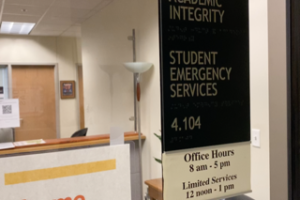UT Students Voice Concerns Over Student Emergency Services Protocol
By Cassidy Ellison
Reporting Texas TV
AUSTIN, Texas — Students face a variety of unexpected emergencies in their personal lives every semester, with some crises taking tolls on both physical and mental health.
The University of Texas at Austin offers Student Emergency Services as a resource to assist students during unprecedented times.
Emergencies that fall under these services include, but are not limited to, missing students, family emergencies, natural disasters, student deaths, medical or mental health concerns and interpersonal violence.
UT’s Student Emergency Services verifies each student’s emergency and then communicates information to each of their professors via email.
“It really is up to the college, the department and the faculty on how they can work with students when emergencies do come up,” said Amy Costa, the assistant director for Student Emergency Services.
UT student Sidney Runeberg faced an unexpected loss of a close friend and former longhorn. She did not know how to return to class without compartmentalizing the traumatic event of the loss of her friend.
“I didn’t really know how fast or when to jump back into school, and just how much leeway I would have in my academics from that point on,” she said.
The email she received lacked specific details of the emergency such as her relationship to the student and instructions for the professor on how to help Runeberg move forward academically.
“The studious UT student in me was like ‘oh my gosh you need to get back to class–I’m feeling behind,’ but the person inside of me who had a soul was like ‘class is the least of my worries.’ I just had a huge life event happen that I need to work through and mourn,” she said.
Ethan Jones, the student body vice president, said the current approach of letting each professor decide how students will operate academically during a crisis is not the most effective. He wants to enact a new policy to change the current protocol.
“I envision that if they could advocate to really see how teachers can remove the burden of tests and assignments for kids when they’re going through these challenging times. I think that’d be the best benefactor for this new protocol,” Jones said.
Jones turned his vision into reality on Friday when he pitched his crisis protocol idea to Provost Sharon Wood who agreed in helping create a new protocol.
“I really do appreciate that. I know she’s really going to work to ensure we can fix this problem moving forward,” Jones said.
Provost Wood has plans to meet with the rest of Jones’ team and the dean of students to adjust the way they currently approach these types of situations.
Runeberg hopes more clarity and comfort will be extended to students who experience a similar situation to hers in the future.

Student Emergency Services is located in the Student Services Building and offers assistance, intervention and recommendations to support students who are facing unexpected trials. (Photo: Cassidy Ellison)